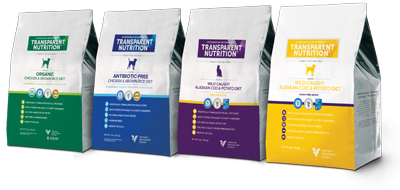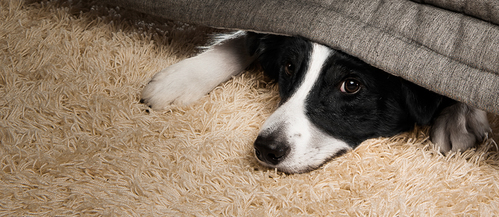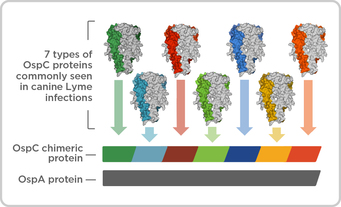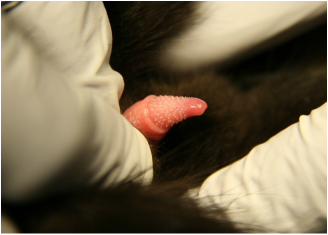|
Whether you're in the city, suburbs or semi-rural areas, if you've seen wildlife, your dog is at risk for Leptospirosis. A recent outbreak in Arizona reminds us about a pervasive, but often overlooked disease, lurking in New Jersey yards.
Sileo is a new oral gel that calms, without causing sedation! Tick Season is Here!At Barnside we have always recommended annual Lyme vaccination for our canine patients. We can now provide better protection with the newest Lyme vaccine from Zoetis.
In Monmouth and Ocean County, there are many species of ticks which frequently cause diseases such as Lyme, Rocky Mt Spotted Fever, Babesia, Ehrlichia and Anaplasmosis. Even if you don't live in a "woodsy" area, raccoons, opossums and other suburban visitors to your yard likely have ticks hitch-hiking a ride.
In NJ, ticks are a problem year-round, but peak tick activity tends to be Spring and Fall (which is also when people and dogs are outside more). Check your pets and family members daily for ticks. In addition to Lyme vaccination, keep your dog on a safe, broad-spectrum tick product such as Bravecto or Frontline year-round. ---Meredith L. Weltner-Sharin VMD WHY DO I NEED TO VACCINATE MY PET?
Rabies is fatal! All mammals, including humans, are susceptible to rabies. There are about 300 confirmed cases of Rabies in NJ every year! There were almost 50 cases of Rabies in Monmouth and Ocean County last year. BUT MY PET DOESN'T GO OUTSIDE! Even if your animal isn't ever "allowed" outside, accidents and escapes happen. Unfortunately, bats in the house, are way more common than anyone likes to think. Rabid wild animals behave erratically and are known to burst through screens and attack people and pets. WHAT HAPPENS:
Rabies is a virus that can affect all mammals. It affects the brain and is almost always fatal once symptoms develop. In NJ, over 300 animals each year are diagnosed as positive for rabies. In Monmouth and Ocean Counties, there were almost 50 cases of diagnosed rabies in 2015! Don't forget, the key word is "diagnosed." This means the animal has to be caught and tested. Countless more wild animals die from rabies. Raccoons account for 77% of land animals that are rabid. Rabies is frequently diagnosed in skunks (14%) cats (4%) foxes (2%) and groundhogs (2%), but rabies has also been diagnosed in deer, dogs, horses, cows, sheep, goats, rabbits and ferrets. Bats are a significant source of rabies too (about 25% of all cases). Mystery of the Cryptorchid Kitty
Hormonal hazards from not neutering your pet, go beyond accidental pregnancy. These past few months at Barnside, we've seen a lot of cases of common, but often preventable, reproductive health problems. Breast CancerBreast cancer happens in animals too!
WHAT HAPPENS: Almost 10% of women in the US will develop some type of breast tumor. In unspayed female dogs, 25% (1 out of every four!), will develop mammary (breast) tumors. Genetics, breed, hormones and obesity all play roles in the development of mammary tumors. It's much less common, but males (human and animal alike) can also get breast cancer. Hormonal hazards from not neutering your pet, go beyond accidental pregnancy. These past few months at Barnside, we've seen a lot of cases of common, but often preventable, reproductive health problems. CryptorchidismCRYPTORCHIDISM ("crip-tor-kid-izm")
WHAT HAPPENS: Failure of the testicles to descend into the scrotum. In normal male mammals, in the scrotum, a tendon-like piece of tissue called the gubernaculum, pulls the testicle from the abdomen (belly), out through the inguinal ring (a slit in the groin), and into the scrotum. In some individuals, this does not happen. These animals have "retained testicles." Hormonal hazards from not neutering your pet, go beyond accidental pregnancy. These past few months at Barnside, we've seen a lot of cases of common, but often preventable, reproductive health problems. Pyometra PYOMETRA ("pie-oh-mee-truh") WHAT HAPPENS: Middle age to older female pets are at higher risk for metritis because every time a dog or cat has a heat cycle (similar to a woman's menstrual cycle) the lining of the uterus becomes a little thicker. The uterus lining is a good place for bacteria to grow. Bacteria can creep up from the vagina, into the uterus and start an infection. The uterus quickly becomes a water-balloon of pus! Warning: some pets develop pyometra on their FIRST heat cycles! Also, pets don't go through menopause and can develop pyometra even at 13 or 14 years old!
|
What's NewThis is where you will find all of the latest happenings at Barnside Veterinary Hospital. Check back often or subscribe to our RSS feed. Categories
All
Archives
March 2022
|






 RSS Feed
RSS Feed



